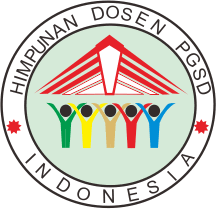Pengaruh modul self regulated learning terhadap prokrastinasi akademik dan keterampilan berpikir kritis mahasiswa PGSD UNS
Abstract
Abstract. The study aims to determine the effect of self-regulated learning modules on academic procrastination and critical thinking skills of college students in PGSD UNS. The type of research is experimental research with a quasi design. The research population was PGSD UNS students with a sample of 67 students. Samples were divided into an experimental class and a control class. The class that became the experimental class was 2E with a total of 34 students, while the class that became the control class was 2F with a total of 33 students. Content validity using Aikens V states all instruments are valid. The reliability instruments using Alpha Cronbach's stated that all instruments were reliable with a coefficient value of 0.833 on the academic procrastination scale and 0.713 for the critical thinking test. Hypothesis Test using Manova Test Multivariate Analysis. The Manova test shows a significance value of 0.000 <0.05. The conclusion is that there is an influence of the self-regulated learning module on academic procrastination and critical thinking skills of PGSD UNS students.
Keywords
Full Text:
PDFReferences
S. Nurjan, “Analisis Teoritik Prokrastinasi Akademik Mahasiswa,” Muaddib Stud. Kependidikan dan Keislam., vol. 1, no. 1, p. 61, 2020, doi: 10.24269/muaddib.v1i1.2586.
B. U. Özer and M. Saçkes, “Effects of academic procrastination on college students’ life satisfaction,” Procedia - Soc. Behav. Sci., vol. 12, no. May 2015, pp. 512–519, 2011, doi: 10.1016/j.sbspro.2011.02.063.
L. J. Solomon and E. D. Rothblum, “Academic procrastination: Frequency and cognitive-behavioral correlates,” J. Couns. Psychol., vol. 31, no. 4, pp. 503–509, 1984, doi: 10.1037/0022-0167.31.4.503.
D. K. Sarajar, “PENGARUH PELATIHAN SELF-REGULATED LEARNING TERHADAP PROKRASTINASI PENYELESAIAN SKRIPSI PADA MAHASISWA TINGKAT Dewita Karema Sarajar THE EFFECT OF SELF-REGULATED LEARNING TRAINING ON Prokrastinasi dalam atau PENDAHULUAN harus dipenuhi Skripsi merupakan sua,” vol. 18, no. 2, 2016.
D. H. Schunk, Learning Theories An Educational Perspective. Yogyakarta: Pustaka Pelajar, 2012.
E. Yanuardianto, “Teori Kognitif Sosial Albert Bandura (Studi Kritis Dalam Menjawab Problem Pembelajaran di Mi),” Auladuna J. Prodi Pendidik. Guru Madrasah Ibtidaiyah, vol. 1, no. 2, pp. 94–111, 2019, doi: 10.36835/au.v1i2.235.
B. J. Zimmerman, “Investigating Self-Regulation and Motivation: Historical Background, Methodological Developments, and Future Prospects,” Am. Educ. Res. J., vol. 45, no. 1, 2008, doi: 10.3102/0002831207312909.
F. Hanifah and D. Rusmawati, “Pengaruh Pelatihan Self-Regulated Learning terhadap Prokrastinasi Akademik pada Siswa SMP Negeri 33 Semarang,” Pengaruh Pelatih. Self-Regulated Learn. Terhadap Prokrastinasi Akad. Pada Siswa Smp Negeri 33 Semarang, vol. 8, no. 2, pp. 124–130, 2019.
E. Rahmawati and F. M. Alaydrus, “Pengaruh Self Regulated Learning Terhadap Kemampuan Berpikir Kritis Dalam Pembelajaran Blended Learning,” J. al–Hikmah, vol. 9, no. 1, pp. 122–129, 2021.
D. M. Gusmawan, N. Priatna, and B. A. P. Martadiputra, “Perbedaan kemampuan berpikir kritis matematis siswa ditinjau dari self-regulated learning,” J. Anal., vol. 7, no. 1, pp. 66–75, 2021, doi: 10.15575/ja.v7i1.11749.
S. Zubaidah, “Self Regulated Learning : Pembelajaran dan Tantangan pada Era Revolusi Industri 4 . 0 1,” Publ. Ilm., vol. 5, no. April, pp. 1–19, 2020.
K. Sitohang, Berpikir Kritis Kecakapan Hidup di Era Digital. Yogyakarta: PT Kanisius, 2019.
Sarjono, “Internalisasi Berpikir Kritis Dalam Pembelajaran Fisika,” J. Madaniyah, vol. 7, no. 2, pp. 343–353, 2017.
M. Husnah, “Hubungan Tingkat Berpikir Kritis terhadap Hasil Belajar Fisika Siswa dengan Menerapkan Model Pembelajaran Problem Based Learning,” J. Phys. Sci. Learn., vol. 1, no. 2, pp. 10–17, 2017.
F. Alatas, “Hubungan Pemahaman Konsep dengan Keterampilan Berpikir Kritis melalui Model Pembelajaran Treffinger pada Mata Kuliah Fisika Dasar,” Edusains, vol. 1, 2014.
R. H. Ennis, “Critical Thinking Dispositions: Their Nature and Assessability,” Informal Log., vol. 18, no. 2, pp. 165–182, 1996, doi: 10.22329/il.v18i2.2378.
W. Suciono, R. Rasto, and E. Ahman, “Analisis Faktor-Faktor yang Mempengaruhi Keterampilan Berpikir Kritis Siswa dalam Pembelajaran Ekonomi Era Revolusi 4.0,” SOCIA J. Ilmu-Ilmu Sos., vol. 17, no. 1, pp. 48–56, 2021, doi: 10.21831/socia.v17i1.32254.
Noviyanti, Yusmansyah, and D. Utaminingsih, “Hubungan Antara Self Regulated Learning dengan Prokrastinasi Akademik,” ALIBKIN (Jurnal Bimbing. Konseling), vol. 7, no. 4, pp. 1–16, 2019, [Online]. Available: http://jurnal.fkip.unila.ac.id/index.php/ALIB/article/view/19301
R. P. Ramadhan and H. Winata, “Prokrastinasi akademik menurunkan prestasi belajar siswa (Academic procrastination reduce students achievement),” J. Pendidik. Manaj. Perkantoran, vol. 1, p. 1, 2016.
I. Wahidah, R. Athallah, N. F. S. Hartono, M. C. A. Rafqie, and M. A. Septiadi, “Pandemik COVID-19: Analisis Perencanaan Pemerintah dan Masyarakat dalam Berbagai Upaya Pencegahan,” J. Manaj. dan Organ., vol. 11, no. 3, pp. 179–188, 2020, doi: 10.29244/jmo.v11i3.31695.
S. Suroto, B. B. Prakoso, M. Ridwan, and D. L. Juniarisca, “Berpikir kritis dan hubungannya dengan prestasi akademik calon guru pendidikan jasmani olahraga dan kesehatan,” J. Olahraga Pendidik. Indones., vol. 1, no. 1, pp. 46–59, 2021, doi: 10.54284/jopi.v1i1.5.
Syahrul, Teori-Teori Pembelajaran. Malang: Literasi Nusantara, 2020.
S. Wardani, “Pendekatan Kontruktivisme dalam Meningkatkan Kemampuan Berfikir Kritis Peserta Didik,” 2020.
I. R. Karo-Karo and Rohani, “Manfaat Media dalam Pembelajaran,” J. Pendidik. dan Mat., vol. 7, p. 1, 2018.
E. Panadero, “A review of self-regulated learning: Six models and four directions for research,” Front. Psychol., vol. 8, no. APR, pp. 1–28, 2017, doi: 10.3389/fpsyg.2017.00422.
Sholikhan and Kusnandi, “The Effect of Inquiry Learning Strategies and Self Regulated Learning on Critical Thinking Skills,” Budapest Int. Res. anda Critics Institute- J., vol. 4, no. 4, pp. 14359–14370, 2021.
L. Johny, L. Lukose, and C. Magno, “The assessment of academic self-regulation and learning strategies: can they predict school ability?,” Educ. Meas. Eval. Rev., vol. 3, no. August 2012, pp. 77–89, 2012.
M. Nitami, D. Daharnis, and Y. Yusri, “Hubungan Motivasi Belajar dengan Prokrastinasi Akademik Siswa,” Konselor, vol. 4, no. 1, p. 1, 2015, doi: 10.24036/02015416449-0-00.
J. I. S. P. & M. N. Lusiana, “Hubungan antara motivasi belajar dan disiplin belajar dengan keterampilan berpikir kritis ips materi interaksi manusia dengan lingkungan dan pengaruhnya pada …,” Didakt. Dwija Indria, vol. 9, no. 1, 2021, [Online]. Available: https://jurnal.uns.ac.id/JDDI/article/view/48771
H. Mortazanajad, F. mostafafi, and S. Vahedi, “Self-Regulation and Dimensions of Parenting Styles Predict Psychological Procrastination of Undergraduate Students,” Iran. J. Psychiatry, vol. 4, no. 4, pp. 147–154, 2009, [Online]. Available: http://ijps.tums.ac.ir/index.php/ijps/article/view/518
M. Wayudi, S. -, and B. Santoso, “Tingkat Kemampuan Berpikir Kritis Siswa Berdasarkan Self Regulated Learning Melalui Metode Guided Discovery Learning,” Edueksos J. Pendidik. Sos. Ekon., vol. 9, no. 2, pp. 18–35, 2020, doi: 10.24235/edueksos.v9i2.6329.
Refbacks
- There are currently no refbacks.



